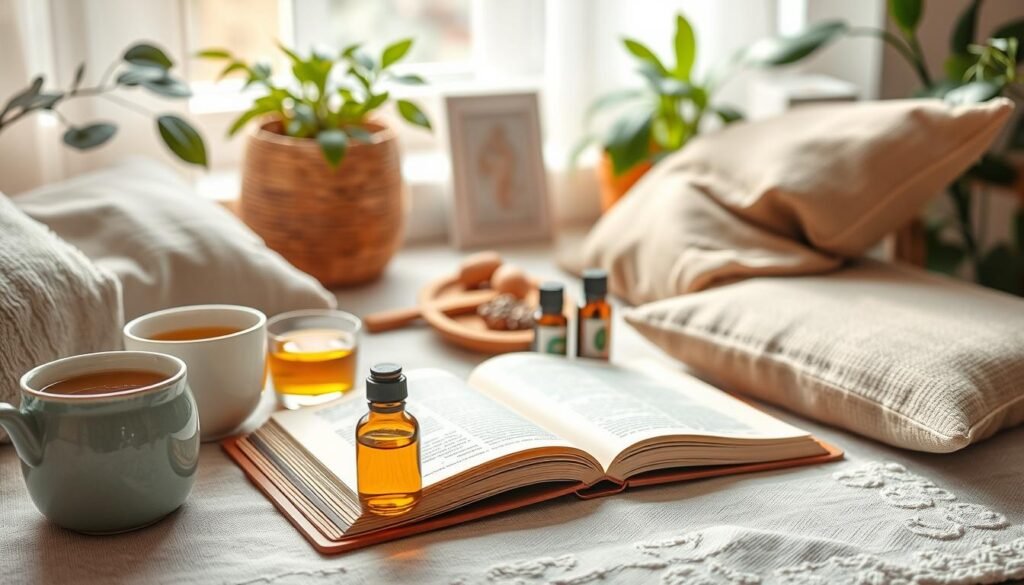About 4.8% of Americans deal with hyperhidrosis, which means they sweat a lot. Anxiety makes it worse for them. This cycle can be hard to stop. But, by knowing why anxiety sweating happens, they can find ways to deal with it. This involves identifying what triggers their sweating and trying expert-recommended solutions.
Lots of people get sweaty when they’re anxious. It’s not just uncomfortable; it can also make social situations hard and affect mental health. Understanding what causes this type of sweat is key. Our goal is to help you find ways to stop anxiety sweating and better your life.
Key Takeaways
- About 3% of the U.S. population experiences excessive sweating related to anxiety.
- Identifying triggers is vital for learning how to stop anxiety sweating.
- Anxiety and depression are closely linked with conditions like hyperhidrosis.
- Adopting lifestyle changes can significantly improve the ability to manage anxiety sweating.
- Consulting a healthcare professional can provide tailored treatment options.
- Practicing mindfulness techniques can help reduce the frequency and severity of anxiety sweating.
- Many effective over-the-counter and prescription options are available to control excessive sweating.
Understanding Anxiety Sweating
Anxiety sweating is a common response to stress that many people face. It happens when the body confronts stress, making our sympathetic nervous system react. We need to explore what triggers anxiety sweating and how our bodies respond. It’s important to know why nervous sweating happens and how it differs from regular sweating.
What Causes Anxiety Sweeting?
Several factors cause anxiety sweating. When we’re anxious, our body releases adrenaline and cortisol. These hormones stimulate our sweat glands, leading to moisture as a defense mechanism. Social anxiety disorder, in particular, often leads to excessive sweating. Up to 32% of people with this disorder experience hyperhidrosis. People with panic disorders or specific phobias also sweat more, whether they’re in a stressful situation or just going about their day.
Difference Between Nervous Sweating and Regular Sweating
There’s a clear difference between nervous and regular sweating. Normally, sweating cools us down during exercise or in hot weather. But nervous sweating comes from anxiety and emotional stress. It can happen even if we’re not physically hot. Different glands in our body are responsible for each type of sweat. The eccrine glands help regulate our temperature, while the apocrine glands kick in during stress.
| Type of Sweating | Trigger | Glands Involved |
|---|---|---|
| Regular Sweating | Heat, Exercise | Eccrine Glands |
| Nervous Sweating | Stress, Anxiety | Apocrine Glands |
How to Stop Anxiety Sweating: Expert Solutions
Understanding and identifying triggers is key to tackling anxiety sweating. Learning your personal triggers helps you manage discomfort. Keeping a journal of situations that make you sweat is useful. It helps spot behavior patterns linked to anxiety.
Identifying Triggers
Triggers differ for everyone. They might be public speaking, hanging out in social settings, or stress at work. Identifying these triggers lets people come up with coping strategies. Effective strategies include relaxation methods before facing a stressful event.
These methods can be deep breathing, picturing peaceful scenes, or meditating for a short time. Such preparation helps reduce anxiety before entering stressful situations. Feeling prepared can make you less anxious.
Being aware of triggers is the first step to overcoming them. This awareness can decrease anxiety sweat. Taking control of your emotions can lessen physical reactions. This is a clear way to combat anxiety sweating.
Anxiety Sweating Remedies
Anxiety sweating can really affect your life. But you’re not alone. There are many ways to lessen this problem. Looking into natural and lifestyle changes can help a lot. This way, you’ll control your sweating better and feel more at ease.
Natural Remedies for Anxiety Sweating
There are natural ways to deal with sweating from anxiety. Drinking herbal teas like chamomile or green tea can help. They make you feel calmer. Using essential oils such as lavender and eucalyptus also works well. They bring relaxation through aromatherapy. Adding these to your daily habits can make a big difference.
Making Lifestyle Changes
Changing your lifestyle is key to dealing with anxiety sweating. Eat lots of fruits, veggies, and whole grains to feel better and more balanced. It’s also important to drink plenty of water. Not drinking enough can make anxiety worse. Exercise regularly to lower your anxiety and sweat less.
Practicing mindfulness and relaxation can also provide relief. These habits make dealing with anxiety sweats easier over time. You can find more tips here.
Reduce Anxiety Sweat Naturally
Anxiety sweat can make life hard. To fight this, using mindfulness and physical activity can help. These methods tackle symptoms and boost emotional strength.
Mindfulness Techniques
Mindfulness quiets the mind and brings peace. With meditation, muscle relaxation, and guided imagery, one can find calm. Focusing on now reduces sweat from anxious thoughts.
Adding these practices daily can help take back control over anxiety. This reduces sweating too.
Physical Activity and Relaxation
Yoga and tai chi are great for easing anxiety sweat. These gentle exercises help the body find peace and balance. Doing these regularly betters physical and emotional health. This is key for managing anxiety.

| Technique | Benefits |
|---|---|
| Meditation | Reduces stress and promotes relaxation |
| Progressive Muscle Relaxation | Helps release built-up tension |
| Guided Imagery | Creates a mental escape from anxiety |
| Yoga | Improves flexibility and encourages calmness |
| Tai Chi | Promotes balance and fosters peace of mind |
Using mindfulness and physical activity can really help with anxiety sweat. Having a routine with relaxation and exercise leads to a balanced, anxiety-sweat-free life.
Coping with Anxiety Sweat
Managing anxiety-induced sweating can feel overwhelming. But, effective meditation practices offer valuable coping strategies. They help individuals focus their minds, take control, and lessen their anxiety.
By committing regularly to meditation, you can address the mental and physical sides of anxiety. This action helps reduce sweating due to anxiety.
Effective Meditation Practices
Several meditation practices can help with anxiety sweat. The following methods are particularly helpful:
- Mindfulness meditation helps you stay in the moment. This practice lets you observe your thoughts without judging them, which brings calm.
- Breath-focused exercises trigger the parasympathetic nervous system. This can reduce stress and anxiety, lessening sweating episodes.
- Body scan meditation brings attention to various body parts. This leads to relaxation and reduced muscle tension, which decreases anxiety sweat.
- Guided imagery allows you to envision calming scenes. This distracts your mind from anxious thoughts and aids in managing physical responses.
Research backs the benefits of these practices. For example, deep breathing signals safety, lessening the threat feelings that often cause anxiety and sweating. Consistent meditation routines build resilience against anxiety sweat triggers. Adding meditation to your daily routine significantly improves how you handle anxiety sweat.
Prevent Sweating from Anxiety
Anxiety can make you sweat a lot in social settings. It’s important to find ways to stop this kind of sweating. Wearing the right clothes and making your surroundings comfortable can help a lot.
Choosing the Right Clothing
Wearing the right clothes can help reduce sweat caused by anxiety. Choose loose, breathable clothes made from natural materials like cotton or bamboo. These fabrics keep you cool and absorb sweat well. Also, drink plenty of water to keep from sweating too much and to stay healthy. Think about wearing special undershirts that soak up sweat, like those from Thompson Tee.
Environmental Comfort Tips
To sweat less from anxiety, keep your living or work space cool. Avoid letting it get too hot, as that can make you sweat more. Use fans and open windows to ensure good air flow. This helps control your body heat.
Try calming techniques like deep breathing and mindfulness to relax. Avoiding caffeine and alcohol before stressful events can also help.
| Clothing Type | Material | Sweat Absorption | Comfort Level |
|---|---|---|---|
| Regular T-shirt | Cotton | Moderate | High |
| Performance Tee | Polyester | Low | Medium |
| Thompson Tee | Cotton/Bamboo Blend | High (100% absorption) | Very High |
Anxiety Sweat Management Strategies
Dealing with anxiety sweat involves both behavior changes and deep breathing. Adding these methods to your day can lessen anxiety and sweating. It’s a big step towards controlling anxiety-related sweat.
Behavioral Techniques
Behavioral techniques help tackle anxiety at its roots. These include cognitive changes, facing fears, and relaxing. By seeing which thoughts cause anxiety, we can learn to fight and switch them. Doing this regularly helps reduce anxiety’s physical signs, like sweating.
Utilizing Deep Breathing Techniques
Deep breathing is key for controlling anxiety and sweating. Practices like diaphragmatic breathing and box breathing relax us in stressful times. These exercises ground us and bring peace. Over time, they can lower stress and anxiety sweat.
| Technique | Description | Benefits |
|---|---|---|
| Diaphragmatic Breathing | Engaging the diaphragm for slow, deep breaths | Reduces anxiety and improves oxygen flow |
| Box Breathing | Breathing in for four counts, holding for four, exhaling for four, and holding again for four | Promotes focus and reduces anxiety symptoms |
| Pursed Lip Breathing | Inhaling through the nose and exhaling slowly through pursed lips | Enhances relaxation and regulates breathing rate |
By using behavior adjustments and deep breathing, you can take back control from anxiety and sweat. Every step forward makes a big difference in fighting anxiety.
Anxiety Sweat Treatment Options
Anxiety-related sweating can be tough to deal with. However, many treatment options exist to help manage it. Each person can find a treatment that works best for their situation. Prescription medications and topical treatments are among the most effective.
Prescription Medications
Prescription medications include anticholinergics. These drugs block signals to sweat glands. Glycopyrrolate and oxybutynin are commonly used. They help reduce sweating in multiple areas and can be used with other treatments.
However, it’s important to talk about side effects like dry mouth or constipation. A healthcare provider can help create a safe and personalized plan.
Topical Treatments and Antiperspirants
Topical treatments are another option for managing anxiety sweat. Prescription-strength antiperspirants, like Aluminum chloride hexahydrate found in Drysol, work by blocking sweat ducts. Topical treatments like Qbrexza are approved for underarm sweating in adults and kids over 9. They provide relief right where you need it.
These solutions can make a big difference in someone’s life. It’s best to consult with a healthcare professional. They can recommend a treatment that fits one’s specific needs.

| Medication Type | Example | Description |
|---|---|---|
| Anticholinergics | Glycopyrrolate | Blocks nerve signals to sweat glands, effective for widespread sweating. |
| Topical Antiperspirants | Drysol | A prescription-strength option that prevents sweat production in specific areas. |
| Topical Anticholinergics | Qbrexza | Targeted treatment for underarm sweating approved for adults and children. |
Control Anxiety-Induced Sweating
Anxiety-induced sweating can really hold people back. It’s important to ask for help, mainly if it feels like too much to handle. Health professionals can guide you through various options that suit you. Talking openly with them lets you manage this issue better, leading to a happier life.
Consulting a Healthcare Professional
If anxiety sweating is a big problem, it’s key to see a healthcare expert. They check how serious it is and how it affects your life. By understanding what sets off your anxiety and sweating, mental health experts can teach you how to cope. They might suggest therapy, medication, or a mix of both.
Consideration of Botox Injections
For severe anxiety sweating, Botox injections could be the answer. They stop the sweat glands from getting signals that make them work overtime. Studies show that many people get a lot of relief from Botox, improving their lives. However, it’s crucial to talk with a doctor first to see if it’s right for you, considering your medical history.
| Treatment Option | Description | Effectiveness |
|---|---|---|
| Consulting a Therapist | Provides coping mechanisms and strategies to manage anxiety. | High |
| Antiperspirants | Topical solutions containing aluminum salts to reduce sweating. | Moderate |
| Oral Anticholinergics | Medications that help reduce sweating by blocking nerve impulses. | Moderate to High |
| Botox Injections | Blocks signals to sweat glands for longer-lasting relief. | High |
Managing Anxiety-Related Sweat Issues
Managing anxiety-related sweat issues needs a two-way approach. This includes both psychological support and hands-on strategies. Support groups are key, as they’re places where people with the same issues can share and learn. They help lessen the loneliness that often comes with anxiety sweating.

Support Groups and Counseling
Counseling is very important for those looking to deeply address their anxiety. Techniques like cognitive behavioral therapy offer ways to change negative thinking. This helps lessen anxiety triggers and manage sweating better. By joining support groups, people find solace in others’ stories. They learn not just from advice but also from hearing others’ fights with anxiety sweats.
If you’re dealing with these symptoms, think about counseling or joining a support group. For more tips and stories on tackling anxiety sweating, check out this useful link.
Conclusion
Anxiety sweating affects many people in the U.S., with about 40 million dealing with anxiety disorders. Recognizing this issue is the first step in finding help. Experts suggest mindfulness, being active, and making your environment comfy can help manage it.
Mixing natural methods and professional help is key in dealing with anxiety. Life changes can help, but sometimes, therapy or meds are needed. Knowing what triggers your anxiety and avoiding things like caffeine can help a lot.
Dealing with anxiety sweating can be tough, but it’s possible to get a handle on it. If trying things on your own isn’t enough, getting professional help is crucial. It’s a journey, but with the right support and dedication, feeling better is possible.